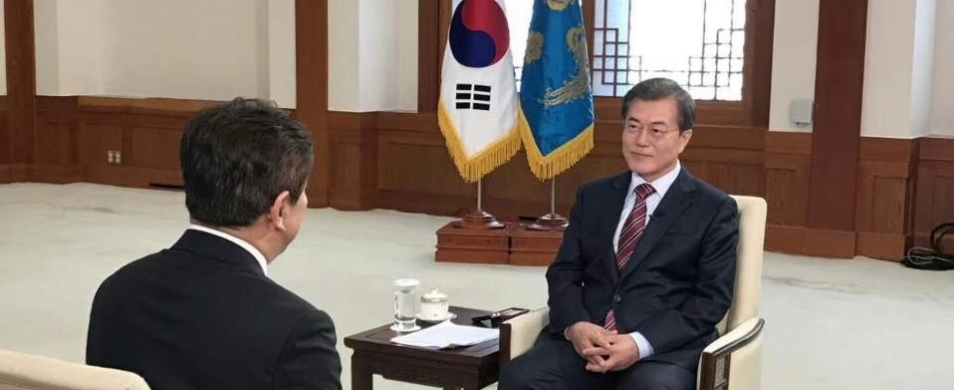 |
|
President Moon Jae-in is interviewed by China’s CCTV at the Blue House on Dec. 8. CCTV aired the interview on Dec. 11, two days before the president was scheduled to begin his state visit the China. During the interview, Moon stated that, “Both Korea and China have their respective opinions on THAAD. In looking at their position, I can understand the other side…[but] I expect that we will come together and overcome the THAAD issue to begin a new era of development between South Korea and China.” (provided by CCTV)
|
Attention is focused on how the two sides will propose handling the North Korean nuclear issue
President Moon Jae-in will hold a summit in Beijing with Chinese President Xi Jinping while visiting China from Dec. 13 to 16 as a guest of the state, the Blue House announced on Dec. 11. With the two leaders scheduled to meet two weeks after North Korea’s Nov. 29 test-launch of the ICBM-level Hwasong-15, attention is focusing on whether the two sides can achieve a breakthrough on the North Korean nuclear and missile issues. Due to remaining differences after the two sides’ decision to patch things up on the THAAD issue, the leaders plan to share the summit’s results in the form of a joint press announcement rather than a joint statement. Sharing the schedule at a Dec. 11 briefing, Blue House National Security Office second deputy chief Nam Gwan-pyo explained, “During this visit [with Moon] as guest of the state on the 25th anniversary of diplomatic relations between South Korea and China, the two leaders are planning to hold in-depth discussions on cooperation to peacefully resolve the North Korean nuclear issue and establish peace on the Korean Peninsula, as well as plans for the promotion of peace, stability, and prosperity for the international community within the region.” Moon is scheduled to meet with Xi for small-scale and expanded summits after attending a formal welcome ceremony at Beijing’s Great Hall of the People on the afternoon of Dec. 14. The two leaders are to discuss the North Korean nuclear and missile issue at the small-scale summit, and economic issues and plans for stronger cooperation in the areas of politics, society, and culture at the expanded summit. Many are watching to see what kind of solution Moon and Xi can find on the biggest issue, namely North Korea’s nuclear and missile programs. With the main goal of sanctions and pressure centering on bringing Pyongyang to the table for dialogue, some are predicting discussions on a diplomatic solution. Xi is seen as very likely to stress the importance of Beijing’s North Korea two-track policy approach combining a denuclearization process with negotiations toward a peace agreement with Pyongyang. Another focus of attention is how the THAAD issue will be addressed at the summit, with Xi and other senior Chinese leaders continuing to bring the matter up even after the two sides’ Oct. 31 agreement on “improving relations.” Moon is expected to focus on moving past the THAAD conflict and normalizing economic cooperation. For now, the two sides have agreed to share the summit results not in a joint statement as a diplomatic document listing areas agreed upon between the leaders, but in a joint press announcement, with each presenting conclusions to the press after coordinating the leaders’ positions beforehand. “A ‘joint statement’ is not essential, as with [US President Donald] Trump’s South Korea visit,” a senior Blue House official said. “We decided not to pursue a joint statement because this is not a situation where [the two sides] can present a unified position,” the official added, indicating that remaining differences on the THAAD issue led the two sides to adopt at an approach where they can voice their own positions rather than struggling to reach an agreement. At a “senior think tank forum for South Korea and China’s future development” held by academic and media experts from both sides in Beijing on Dec. 11, Chinese People's Institute of Foreign Affairs (CPIFA) vice president Wei Wei represented the position of hardliners in China. “Without a complete resolution of the THAAD issue, a complete improvement in relations [between South Korea and China] is out of the question,” he said. “The greater responsibility for the worsening crisis on the Korean Peninsula lies with South Korea and the US,” Wei added. In addition to Xi, Moon is also scheduled to meet during his visit with State Council Premier Li Keqiang, National People’s Congress Standing Committee chairman (the equivalent of speaker of parliament) Zhang Dejiang, and Chongqing Communist Party secretary and close Xi associate Chen Min’er. By Park Min-hee, international editor, and Kim Bo-hyeop and Seong Yeon-cheol, staff reporters Please direct questions or comments to [english@hani.co.kr]






